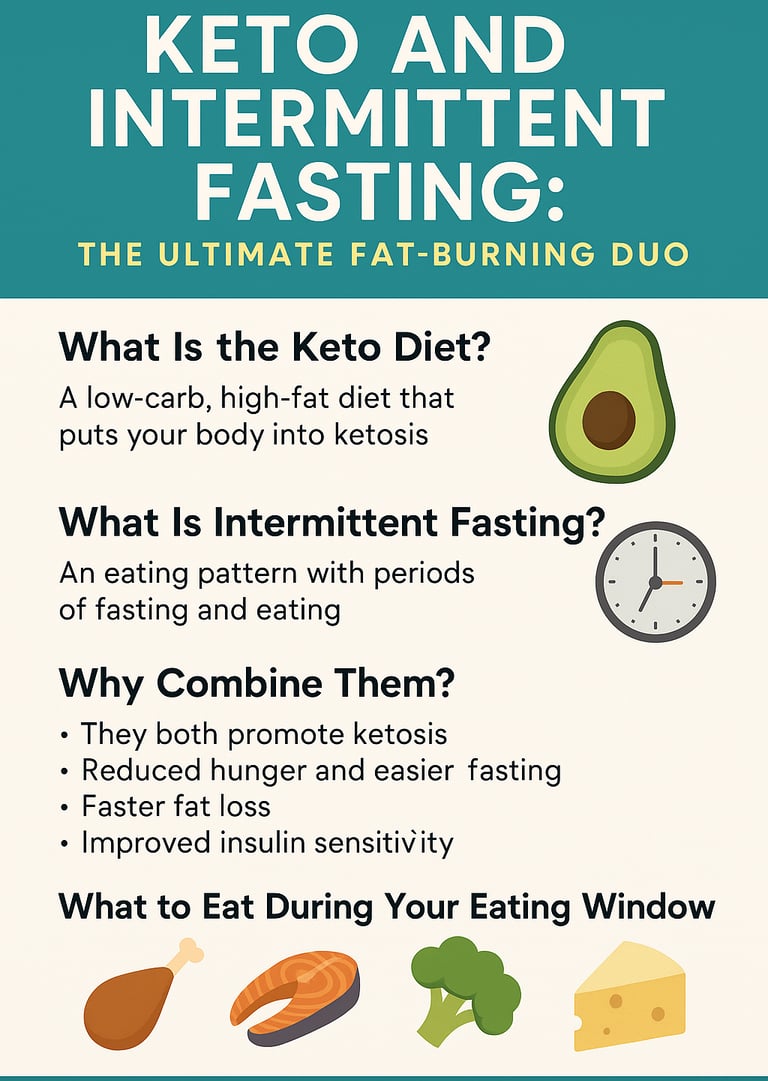Keto and Intermittent Fasting: The Ultimate Fat-Burning Duo
Discover how combining keto and intermittent fasting can supercharge your weight loss, boost energy, and simplify your eating habits. Learn how to get started, what to eat, and why this combo works.
5/20/20254 min read


Keto and Intermittent Fasting: The Ultimate Fat-Burning Duo
Let’s be honest: losing weight, gaining energy, and staying consistent with healthy habits isn’t always easy—especially when life gets chaotic. But what if there was a way to simplify your routine and still burn fat efficiently? That’s where the power combo of keto and intermittent fasting comes in.
If you’ve tried keto or fasting separately, you might already know their benefits. But when you put them together? That’s where the magic happens.
In this post, we’ll break down:
What keto and intermittent fasting are
Why they work so well together
The best intermittent fasting schedules for keto
What to eat during your eating window
Tips to get started without feeling overwhelmed
Let’s dive in!
What Is the Keto Diet?
The ketogenic diet (aka "keto") is a low-carb, high-fat way of eating that trains your body to burn fat for fuel instead of carbs. When you limit carbs (usually to around 20-50g per day), your body enters ketosis—a metabolic state where you burn fat and produce ketones for energy.
People love keto for its benefits:
Rapid fat loss
Reduced hunger and cravings
Stable blood sugar
Improved mental clarity
But keto isn’t just about cutting carbs. It’s about nourishing your body with healthy fats, quality proteins, and low-carb vegetables.
What Is Intermittent Fasting?
Intermittent fasting (IF) is not a diet—it’s an eating schedule. It involves cycling between periods of eating and fasting. There are several popular methods:
16:8: Fast for 16 hours, eat during an 8-hour window (most popular)
18:6: A slightly longer fast with a 6-hour eating window
OMAD (One Meal a Day): Fast for 23 hours, eat one large meal
5:2: Eat normally for 5 days, drastically reduce calories on 2 non-consecutive days
During the fasting period, you avoid calories but can have water, black coffee, tea, and electrolytes.
Intermittent fasting benefits include:
Enhanced fat burning
Increased human growth hormone (great for fat loss and muscle maintenance)
Better insulin sensitivity
Cellular repair (thanks to autophagy)
Simpler routines—less meal prep!
Why Keto + Intermittent Fasting Work So Well Together
Here’s the exciting part: combining keto and intermittent fasting can amplify the benefits of each.
Here’s why they’re a match made in fat-burning heaven:
1. They Both Promote Ketosis
Fasting naturally lowers insulin levels and depletes glycogen (stored carbs), pushing your body into ketosis faster. If you’re already doing keto, fasting can help you get into ketosis more quickly—and stay there longer.
2. Reduced Hunger and Easier Fasting
Keto stabilizes blood sugar and reduces hunger hormones like ghrelin. That means you’re less likely to feel ravenous during your fasting window. No more white-knuckling through your fast!
3. Faster Fat Loss
Keto trains your body to burn fat for fuel. Intermittent fasting helps you tap into those fat stores even more efficiently. Together, they create a powerful fat-burning engine.
4. Improved Insulin Sensitivity
Both approaches help lower insulin resistance, a key factor in weight gain and metabolic dysfunction. This combo is especially powerful for those with PCOS, prediabetes, or stubborn belly fat.
5. Simplified Eating
Only eating in a set window means fewer meals to plan and prep. You can skip breakfast, enjoy two hearty meals, and be done for the day. This saves time and mental energy—which busy moms, professionals, and students can all appreciate.
What Intermittent Fasting Schedule Works Best with Keto?
If you're new to fasting, start slow. Here are a few popular schedules and how they work with keto:
Beginner: 12:12 Fasting
Eat from 8 AM to 8 PM, fast overnight
Great for easing into IF without much disruption
Intermediate: 16:8 Fasting
Eat from 12 PM to 8 PM, fast from 8 PM to 12 PM
Most popular method; works well with keto’s appetite suppression
Advanced: 18:6 or OMAD
Eat between 12 PM and 6 PM, or one big meal at dinner
Ideal for people who already feel full and satisfied on keto
May lead to deeper ketosis and greater fat loss
Tip: Don’t rush into OMAD. Give your body time to adjust to both keto and fasting first.
What Should You Eat During Your Eating Window?
Focus on nutrient-dense, keto-friendly foods to get the most from your eating window. Here’s what to prioritize:
Healthy Fats:
Avocados
Olive oil, coconut oil, MCT oil
Grass-fed butter or ghee
Fatty cuts of meat
Full-fat dairy (cheese, cream)
Quality Proteins:
Eggs
Chicken thighs
Ground beef
Salmon or sardines
Pork chops
Low-Carb Veggies:
Spinach, kale, arugula
Broccoli, cauliflower, zucchini
Mushrooms, bell peppers
Low-Glycemic Fruits (in moderation):
Berries (strawberries, raspberries)
Avocado (yes, it’s a fruit!)
Electrolytes & Hydration:
Add sea salt to your meals
Drink water, bone broth, and sugar-free electrolytes
Sip on black coffee or herbal teas during your fast
Common Mistakes to Avoid
Jumping Into Both at Once
If you’re new to keto and fasting, start with keto first. Let your body adjust to fat-burning before layering on fasting.
Not Eating Enough
Just because you’re eating less often doesn’t mean you should under-eat. Get enough calories and nutrients during your window to support energy, hormones, and recovery.
Overeating at the Breaking Point
Don’t binge when your eating window opens. Stick to balanced, high-fat meals that keep you full and satisfied.
Skipping Electrolytes
Keto and fasting both deplete electrolytes like sodium, potassium, and magnesium. Headaches, fatigue, and “keto flu” symptoms are often due to low electrolytes—not carbs!
Simple Daily Routine: Keto + 16:8 Fasting
Here’s what a typical day might look like:
Morning (Fasting)
Water + pinch of sea salt
Black coffee or herbal tea
12 PM (First Meal – Break Fast)
2 eggs cooked in butter
Avocado slices
Spinach sautéed in olive oil
Electrolyte drink
3 PM (Snack – Optional)
Cheese stick or handful of almonds
Bulletproof coffee or tea
7 PM (Dinner)
Grilled salmon with broccoli
Cauliflower mash with garlic butter
Mixed greens salad with olive oil
8 PM – Begin Fasting Again
Real Benefits People Experience
When combining keto with intermittent fasting, many people report:
✔ Faster weight loss
✔ Reduced cravings and snacking
✔ More mental clarity and focus
✔ Less bloating and better digestion
✔ Simplified daily routine
✔ Improved confidence and control around food
It’s not just about dropping pounds—it’s about feeling better in your body and mind.
Final Thoughts: Is Keto + IF Right for You?
If you’re struggling to lose weight, feeling sluggish, or overwhelmed by complicated diets, the keto and intermittent fasting combo may be your solution.
Start simple. Drink your coffee, skip breakfast, and focus on whole, keto-friendly foods. Within a few days or weeks, you’ll likely notice more energy, fewer cravings, and a boost in confidence.
As always, listen to your body and talk to your doctor if you have underlying health conditions—especially if you're pregnant, breastfeeding, or diabetic.
Ready to try keto + IF?
Start with a 7-day keto meal plan and build your fasting window gradually. Want one already made for you? Free 7-Day meal plan!
Explore delicious keto recipes and diet tips.
Diet
Disclaimer: Keto With Me participates in the Amazon Services LLC Associates Program, an affiliate advertising program designed to provide a means for sites to earn advertising fees by advertising and linking to Amazon.com.
ketowithme@ketowithme.net
© 2025. All rights reserved.
Health
